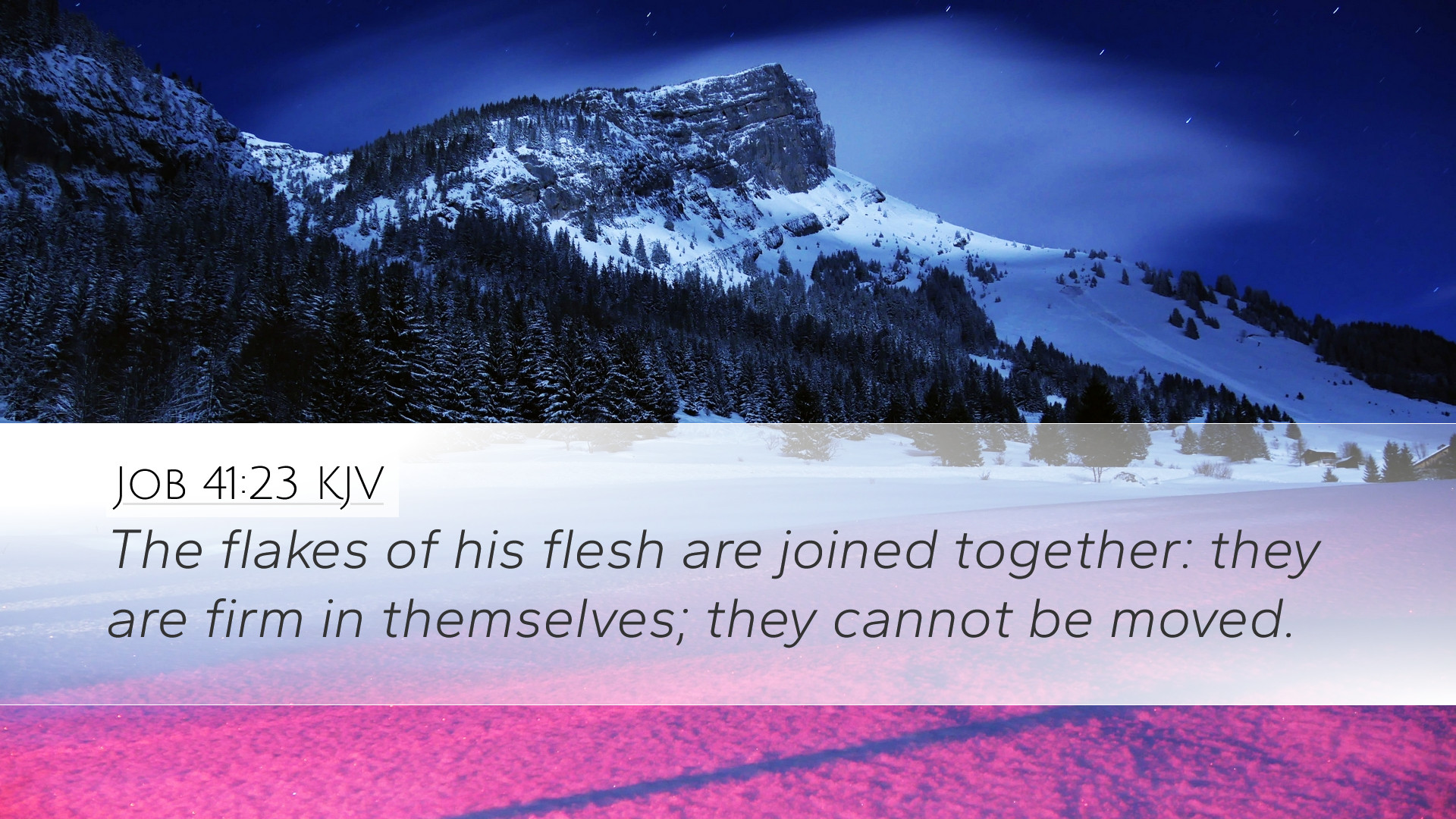Commentary on Job 41:23
Verse: Job 41:23 - "The flakes of his flesh are joined together: they are firm in themselves; they cannot be moved."
Introduction
The description of Leviathan in Job 41 serves as a part of God’s discourse with Job, who has been in profound questioning of God’s justice in his suffering. This specific verse highlights the formidable strength and unyielding nature of this creature, which parallels God's own power and sovereignty over creation. The public domain commentaries provide deep insights that can enrich understanding for pastors, students, theologians, and Bible scholars.
Commentary Insights
1. The Nature of Leviathan
Matthew Henry: Henry emphasizes that Leviathan symbolizes chaos and untamed elements in creation. The "flakes of his flesh" represent not just the literal aspect of Leviathan's physical form but also metaphorically depict the larger principles of strength and resilience. His smooth, joined flesh signifies that despite adversity, this creature stands unyielded, echoing God’s dominion over chaos.
Albert Barnes: Barnes notes the impenetrable nature of Leviathan’s skin, suggesting that no weapon formed against it can prevail, illustrating God's wisdom in creating beings beyond human mastery. The term “joined together” highlights the way this creature is designed by God, reminding us that there are aspects of His creation that remain a mystery—reflecting God’s grandeur and our human limitations.
Adam Clarke: Clarke interprets the imagery, commenting that Leviathan's texture and structure embody the artistic and intentional designs of the Creator. The firmness of Leviathan’s flesh indicates that God has set boundaries in nature which humans cannot breach, thus reinforcing God's authority and the limits of human understanding.
2. Divine Sovereignty
Matthew Henry: The focus on the physical attributes of Leviathan points to God’s sovereignty and superior might. Henry emphasizes that just as Leviathan cannot be moved, so too can God’s will not be intercepted or thwarted by human expectation or suffering.
This becomes a comforting truth for believers, assuring them of God’s active governance over the chaos of life.
Albert Barnes: Barnes expands on the idea of divine control, noting that this passage serves as a reminder of how human beings can often feel powerless in the face of adversity, likened to the struggle against Leviathan. Verse 23 reassures us of God’s encircling righteousness and power that governs all creation, including high, mighty, and terrifying elements beyond human comprehension.
Adam Clarke: Clarke brings attention to the spiritual implications of God’s therefore unchallengeable rule, suggesting that the Israelites, hearing this passage, would understand God as the ultimate protector against the chaos represented by Leviathan. Clarke’s interpretation reinforces the theme of trust in God’s sovereignty amidst turmoil.
3. Human Limitations and Divine Majesty
Matthew Henry: The physical depiction of Leviathan causes one to reflect on human vulnerability and limitations in the face of such magnificent creation. In light of our fragility, Job’s lament becomes more profound; he is but a creature seeking to understand his Creator. Henry suggests that this induces humility, leading believers back to God’s omnipotent presence.
Albert Barnes: According to Barnes, the design behind such a creature is to remind us of our position relative to God’s power. The impossibility of subduing Leviathan serves as a divine parable of humanity's search for meaning, balance, and control within creation and God’s overarching authority. This recognition is pivotal in theological reflection and spiritual growth.
Adam Clarke: Clarke focuses on the theological implications—highlighting that acknowledging our limitations is crucial for authentic faith. The understanding of Leviathan’s strength and stability calls each individual to recognize God’s majesty over their lives. This prompts theologians to engage deeper with concepts of freedom, authority, and submission in their faith journey.


